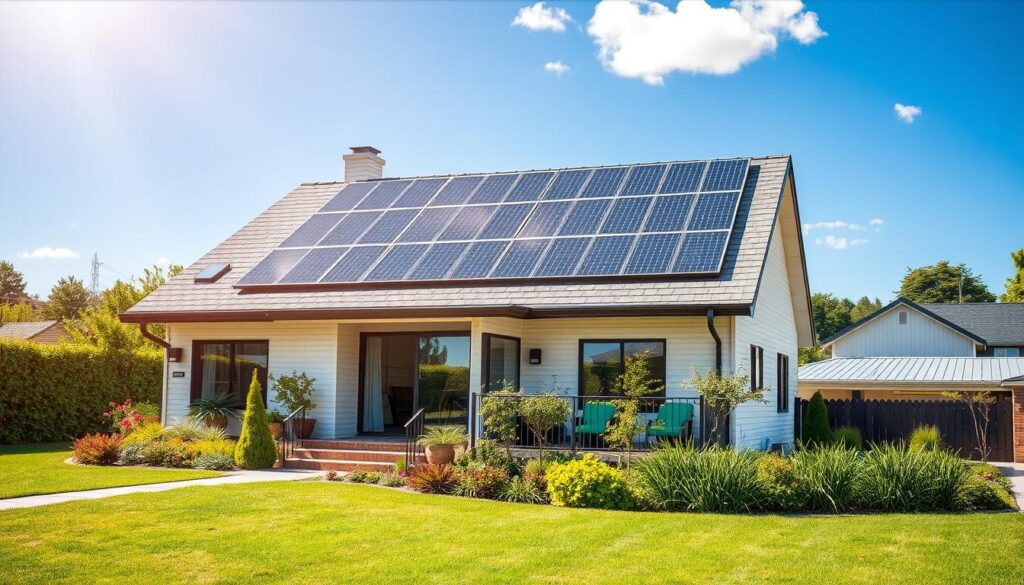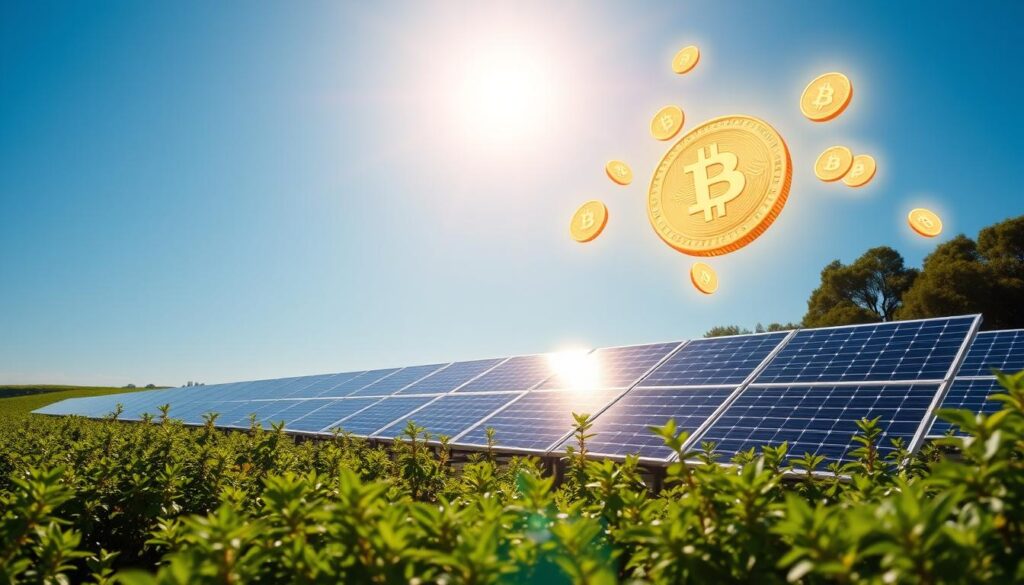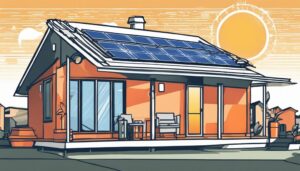Nearly 4 million American households are already generating their own power with solar energy, a testament to the growing popularity and benefits of this renewable power source. From affordability to environmental benefits, solar energy offers a multitude of advantages that are making it an increasingly attractive option for homeowners in Australia. Let’s explore the top five reasons why solar energy is worth considering.
Key Takeaways
- Solar energy is a renewable and sustainable power source that generates electricity without producing harmful emissions or greenhouse gases.
- Homeowners can save money on their monthly utility bills by going solar, with the monthly cost of a solar loan often less than the average electricity bill.
- Solar panels can increase the value of a home, making it a worthwhile investment for homeowners.
- Solar energy systems work in various climates, including regions with longer, colder winters, providing reliable power year-round.
- Solar energy offers energy independence, allowing homeowners to generate their own power and maintain electricity during grid disruptions.
Solar Panels are Increasingly Affordable
Residential solar is becoming more accessible than ever, thanks to the availability of federal tax credits and diverse financing options. The federal residential solar tax credit currently allows taxpayers to claim a 30% tax credit on the cost of their solar system, though this credit is set to decrease to 26% after January 1, 2033. This significant financial incentive has made affordable solar a reality for many homeowners.
In addition to tax credits, residential solar is increasingly accessible due to the variety of solar financing options on the market. Homeowners can choose from solar loans, leases, or power purchase agreements, which often result in monthly payments lower than their average utility bills. These financing solutions make it possible for homeowners to go solar with little to no money upfront.
“Solar energy has become the main source of energy for an increasing number of families due to solar panel grants and competitive market prices.”
With the combination of tax credits and innovative financing, solar panels are more affordable than ever for homeowners in Australia. This increased affordability has led to a surge in residential solar installations, as more people recognize the long-term cost savings and environmental benefits of harnessing the power of the sun.
You Can Save Money by Going Solar
Switching to solar energy is a smart way to save money on your monthly utility bills. Solar offers great potential to reduce your electricity costs, and with utility bills trending upward, solar is likely to remain a good money-saving option for years to come. The amount you can save depends on factors like your electricity consumption, the size of your solar system, and how much power it generates.
One way to save with solar is by opting for a leased, third-party owned system. This allows you to host a solar energy system on your rooftop and purchase the generated electricity at a discounted rate, often less than what your utility company charges. This also lets you lock in electricity rates for years, protecting you from future price hikes.
| Savings Potential with Solar | Estimated Savings |
|---|---|
| Small Household (3 kW System) | Over $40,000 over 20 years |
| Medium Household (5 kW System) | Can increase home value by $30,000 |
| Greenhouse Gas Reduction | 8,000 tonnes per year (5 kW System) |
In addition to direct cost savings, solar can also increase the value of your home. Studies show that properties with solar panels sell at higher prices compared to those without, with a 5-kilowatt system potentially adding up to $30,000 to the home’s value.
With utility bills on the rise and the environmental benefits of solar, making the switch to renewable energy is a smart financial decision that can save money with solar, reduce your solar cost savings, and lower your solar utility bill savings for years to come.
Solar Power Provides Energy Independence
Generating your own solar power can give you the freedom to keep the lights on, even when there’s a disruption in the main power grid. Residential solar energy systems paired with battery storage—often called solar-plus-storage systems—provide a reliable source of power regardless of the weather or the time of day, without having to rely on backup power from the grid.
As battery technology continues to improve and financial incentives for energy storage become more widely available, the decision to invest in battery storage is becoming increasingly sensible for households across Australia. This solar-plus-storage setup offers a level of energy independence that can provide peace of mind during unexpected power outages or grid disruptions.
The Benefits of Solar-Plus-Storage Systems
- Maintain power during grid failures or blackouts
- Reduce reliance on the main electrical grid and fossil fuel-based energy sources
- Provide a reliable backup power source for your home
- Increase your overall energy independence and security
- Potentially reduce your monthly electricity bills by using stored solar energy
With the rapid advancements in solar and battery storage technology, as well as the growing availability of financial incentives, more and more Australian households are choosing to invest in solar-plus-storage systems to achieve greater energy independence and security.
“Solar power provides the freedom to keep the lights on, even when the grid goes down.”
| Key Benefit | Description |
|---|---|
| Energy Independence | Solar-plus-storage systems allow you to generate, store, and use your own renewable energy, reducing reliance on the main grid and fossil fuels. |
| Reliable Backup Power | Your solar battery storage can keep your home powered during grid outages, providing a dependable source of electricity. |
| Cost Savings | Using your stored solar energy can help lower your monthly electricity bills, especially during peak demand periods. |
Solar Energy Increases Home Value
Installing a solar energy system in your home can significantly boost its resale value. According to a Berkeley National Laboratory study, homebuyers across Australia have shown a willingness to pay a premium for homes with solar photovoltaic panels, viewing them as valuable upgrades akin to a renovated kitchen or finished basement.
In fact, research by realestate.com.au reveals that 85% of participants believe solar panels add value to a home. Additionally, a survey by Origin Energy found that 77% of Australians consider a house with solar more valuable than one relying on traditional energy sources, with 57% willing to pay up to $10,000 more for a solar-powered home.
The increased value from a 5kW solar installation has been estimated at around $29,000. This is partly due to the financial incentives provided by the Australian Government through the Small-scale Technology Certificates (STCs) program, which can significantly reduce the upfront cost of a solar system for residential homeowners.
Solar energy typically increases a home’s value by 4.1% nationwide, and the installation of solar panels has the potential to recover its cost in the resale price of the home. Additionally, solar systems generally require very low maintenance, with the main component, the inverter, typically needing replacement after 5 to 10 years of operation.
By switching to a solar energy system, homeowners can not only benefit from long-term savings on their electricity bills but also enjoy the added value it brings to their property when they decide to sell. With the growing demand for sustainable and energy-efficient homes, investing in a solar increase home value can be a wise decision for both your finances and the environment.

| Statistic | Value |
|---|---|
| Percentage of participants who believe solar panels add value to a home | 85% |
| Percentage of Australians who consider a house with solar more valuable | 77% |
| Percentage of Australians willing to pay up to $10,000 more for a solar-powered home | 57% |
| Estimated increased value from a 5kW solar installation | $29,000 |
| Nationwide increase in home value with solar energy | 4.1% |
“Solar energy typically increases a home’s value by 4.1% nationwide.”
What are 5 advantages of solar energy?
Solar energy is a renewable and environmentally friendly power source that offers a multitude of advantages for homeowners and businesses alike. From affordability to energy independence, the benefits of solar energy are numerous and compelling. Let’s explore the five main advantages of making the switch to this sustainable energy solution.
1. Affordability
Residential solar is more affordable than ever, thanks to federal tax credits and financing options that make purchasing solar systems easier with less money upfront. The cost of solar PV modules has decreased by an average of 62% annually in recent years, making solar a viable option for more households.
2. Cost Savings
Solar offers great potential to save money on your monthly utility bill, and with electricity prices trending upward, solar is likely to remain a good money-saving option for years to come. Additionally, solar energy reduces a household’s carbon footprint by using a clean and sustainable energy source, further contributing to long-term cost savings.
3. Energy Independence
Generating your own solar power can give you the freedom to keep the lights on if there’s a disruption in power, especially when paired with battery storage. This energy independence can provide peace of mind and financial security during times of grid instability or outages.
4. Increased Home Value
Installing a solar energy system on your property can significantly increase its value, making it a wise investment for homeowners. Studies have shown that homes with solar panels sell for higher prices than those without, providing an additional financial benefit to going solar.
5. Versatility Across Climates
Solar panels only need sunshine to generate electricity, making solar viable even in areas with longer, colder winters or different weather conditions. This versatility ensures that solar energy can be a viable power solution for a wide range of climates and geographical regions.
Embracing the advantages of solar energy can not only save you money, but also contribute to a more sustainable future. As the world continues to shift towards renewable and clean energy sources, the benefits of solar power make it an increasingly attractive option for homeowners and businesses alike.
Solar Systems Work in Various Climates
Contrary to popular belief, solar panels are a viable option for homes and businesses across a wide range of climates, even in areas with longer, colder winters or other challenging weather conditions. Solar energy’s versatility makes it an attractive renewable power source no matter where you live.
While locations with abundant sunshine tend to maximize solar energy production, solar panels can still generate a significant amount of electricity in less sunny or even overcast conditions. In fact, solar panels can produce 10–25% of their normal output even on dark, cloudy days. This means that solar in different climates, solar in cold climates, and solar in winter can all be highly viable options for homeowners and businesses alike.
The U.S. Department of Energy’s Solar Energy Technologies Office (SETO) is dedicated to ensuring solar panels can withstand the elements no matter your location. SETO funds five Regional Test Centers across the country — each in a different climate — to make sure panels perform as best they can, regardless of climate or weather.
Even in the winter when there are fewer hours of daylight, there is still a sufficient amount of sunshine to power the average Australian home. Queensland has the highest rate of household solar installations in Australia, with 1-in-3 homes using solar. More than 830,000 small businesses and homes in Queensland now have rooftop solar, with over 150 new systems installed on average every day.
| Location | Solar Panel Viability |
|---|---|
| Cold Climates | Solar panels can still generate 10-25% of their normal output even on cloudy, winter days. |
| Sunny Climates | Locations with abundant sunshine maximize solar energy production. |
| Overcast Climates | Solar panels can still produce a significant amount of electricity in less sunny conditions. |
“Solar panels only need sunshine to generate electricity, making solar viable even in areas with longer, colder winters or different weather conditions.”
Renewable and Environmentally Friendly
Renewable solar energy is a clean and sustainable power source that comes with significant environmental benefits. Unlike fossil fuels, solar energy creates no carbon emissions or other greenhouse gases, avoiding the harmful environmental impact associated with mining or drilling.
Solar panels only require sunshine to generate electricity, making them a truly renewable and environmentally friendly option. Solar power systems also use little to no water, unlike traditional power plants that rely on steam turbines. By embracing the advantages of solar energy, we can reduce our reliance on polluting fossil fuels and contribute to a greener, healthier planet.
“The more we can capture the benefits of solar energy, the less we will rely on fossil fuels, which is better for the environment.”
In fact, solar panels may pay off their greenhouse gas emissions within just one to four years of installation, according to the Office of Energy Efficiency & Renewable Energy. This underscores the remarkable sustainability of this renewable energy source.
With solar power becoming increasingly accessible and affordable, the adoption of environmentally friendly solar energy is on the rise. Across regional Queensland, approximately one in four homes already have solar power installed, demonstrating the growing popularity and acceptance of this clean energy solution.
Potential for Solar Renewable Energy Credits
As the adoption of solar energy continues to grow, some states in India are offering an incentive known as solar renewable energy credits (SRECs). These credits represent the environmental benefits of generating electricity through solar power, and electricity suppliers can purchase them to meet their state’s Renewable Portfolio Standard requirements.
If you install a solar energy system, you can earn SRECs based on the amount of electricity your system generates. These SRECs can then be sold on the SREC market, providing an additional revenue stream to offset the initial cost of your solar investment. This makes solar energy an even more attractive option for homeowners and businesses looking to reduce their energy bills and carbon footprint.
| Benefit | Description |
|---|---|
| Earn Extra Income | Selling SRECs can provide additional income to offset the cost of your solar system. |
| Support Renewable Energy Initiatives | By selling SRECs, you are contributing to the growth of solar energy and helping states meet their renewable energy goals. |
| Increase Solar Adoption | The SREC market helps make solar energy more affordable and accessible for homeowners and businesses. |
To take advantage of this incentive, it’s important to research the SREC market in your state and understand the registration and sales process. By leveraging solar renewable energy credits, you can maximize the benefits of your solar energy investment and contribute to the solar energy incentives that are driving the growth of this clean, renewable power source.

“The potential for solar renewable energy credits is a powerful incentive that can make solar energy even more accessible and attractive for homeowners and businesses.”
Low Maintenance Costs
When it comes to solar energy, one of the key advantages is the low maintenance costs associated with solar panel systems. Unlike traditional energy sources that require ongoing fuel costs and regular maintenance, solar panels have no moving parts that wear out over time, leading to remarkably low upkeep expenses.
In fact, studies show that solar power systems can result in 50-70% savings on electricity bills for homeowners and businesses compared to traditional energy sources. This is due to the long lifespan of solar panels, which typically last 25-30 years with minimal maintenance required.
Solar panel manufacturers offer warranties ranging from 20 to 25 years, ensuring that your investment in low maintenance solar technology will continue to provide long-term value. All you need to do is keep your panels clean and in good physical condition, and they’ll keep generating clean, renewable electricity for decades to come.
While the initial installation cost of a solar panel lifespan may be higher than traditional energy sources, the solar maintenance costs are significantly lower, making solar a smart and cost-effective choice for homeowners and businesses alike.
| Maintenance Requirement | Frequency | Estimated Cost |
|---|---|---|
| Panel Cleaning | 2-4 times per year | $50-$100 per cleaning |
| Inverter Replacement | Every 10-15 years | $500-$1,500 per replacement |
| System Inspection | Annually | $100-$300 per inspection |
By investing in low maintenance solar technology, you can enjoy the benefits of renewable energy while minimizing the ongoing costs and hassle associated with traditional energy sources. With their long lifespan and low solar maintenance costs, solar panels offer a smart and sustainable solution for your energy needs.
Conclusion
In conclusion, the five main advantages of solar energy are affordability, cost savings, energy independence, increased home value, and versatility across climates. Solar panels are becoming increasingly affordable, with government incentives helping Australian homeowners save an average of 38% off the initial cost. Additionally, solar can save you money on your utility bills, providing a return on investment in just 3-4 years and free solar electricity for 20-25 years thereafter.
Solar power also offers energy independence, allowing you to generate your own electricity and keep the lights on even during power disruptions. Furthermore, installing solar panels can increase the value of your home, making it a wise investment. And with solar panels able to work effectively in a variety of climates, they are a versatile energy solution that can be installed anywhere with direct access to sunlight.
With the environmental benefits of reducing carbon emissions and fossil fuel demand, along with the financial incentives and technological advancements, it’s clear that solar energy offers significant advantages for homeowners in Australia. By harnessing the power of the sun, you can enjoy the cost savings, energy independence, and environmental benefits that solar energy provides.



